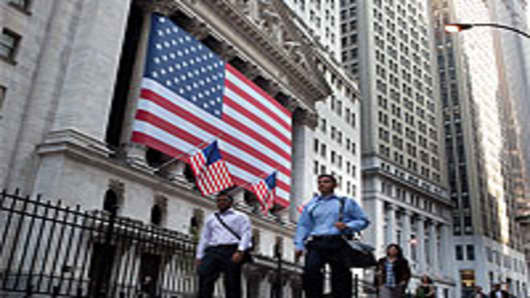Many executives spent the weekend trying to assess the impact of the legislation, which has yet to take final form. With some crucial differences between the House and Senate versions of the bill remaining, lawmakers will confer over the next few weeks and try to reach a final version before Congress’s Fourth of July recess. But Wall Street’s initial verdict seems to be that it could have been much more draconian.
“If you talk to anyone privately, there’s a sigh of relief,” said one veteran investment banker who insisted on anonymity because of the delicacy of the issue. “It’ll crimp the profit pool initially by 15 or 20 percent and increase oversight and compliance costs, but there’s no breakup of any institution or onerous new taxes.”
The reaction of the market to the legislation echoed that view. Stocks of financial institutions performed well on Friday, with shares of JPMorgan Chase and Morgan Stanley each up 5 percent.
Richard Ramsden, an analyst for Goldman Sachs, estimated that the bill passed by the Senate on Thursday would initially cut profits by as much as 20 percent, a sizable bite, but hardly catastrophic given the sharp rebound in earnings since the depth of the financial crisis. Big banks and brokerage firms, experts said, will adjust to the changes, creating new revenue streams to make up for reduced profits, and find ways to work around the new regulations.
In other words, the industry’s landscape may not be facing an earthquake, after all.
“The health care bill is going to transform the structure of health care exponentially more than this legislation on financial regulation is going to change Wall Street,” said Roger C. Altman, the chairman of Evercore Partners and deputy Treasury secretary in the Clinton administration. “It’s not even close.”
There is still much in the bill to irritate big financial firms, like a ban on owning hedge funds, as well as stepped-up oversight and scrutiny of things as varied as derivatives trading and debit card fees. “We aren’t crying poverty,” said Scott E. Talbott, a lobbyist for the Financial Services Roundtable, an industry group representing big financial firms. “We are crying overreaction and overregulation.”
Still, it could have been worse. The Senate rejected rules that would have broken up huge banks considered “too big to fail,” or imposed limits on their size. Caps on how much banks can charge credit card holders to borrow also fell by the wayside. And the long-established wall between trading and commercial banking, which was torn down in 1999, will not be going back up.



